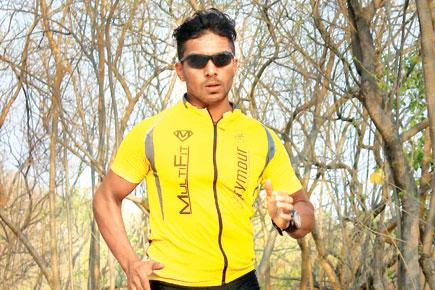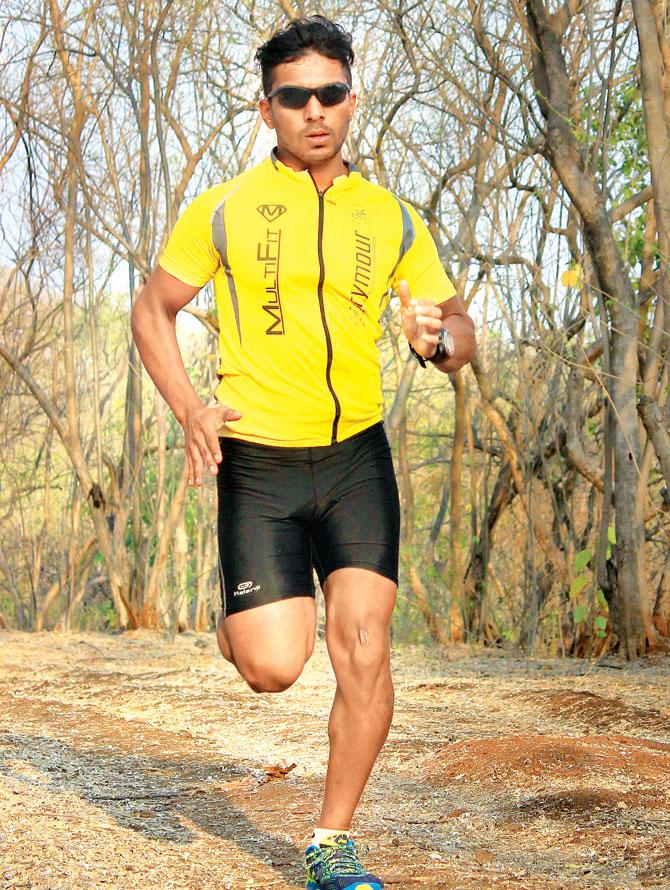Chaitanya Velhal will take part in an exhaustive race that has 3.86 km of swimming, 180.25 km of cycling and 42 km of running at Ironman in Switzerland

Eyes on the prize: Punekar Chaitanya Velhal. Pic/Akash Jagtap
For the average middle-class Indian, choosing between sports and education is the hardest choice. Punekar Chaitanya Velhal found himself rediscovering his long lost love for sports after three years of working as a research scientist, and today, the 27-year-old aims to be the fastest Indian Ironman.
ADVERTISEMENT

Eyes on the prize: Punekar Chaitanya Velhal. Pic/Akash Jagtap
All set to compete on July 24 at Ironman in Switzerland — touted to be one of the toughest triathlon races — Velhal will brave temperatures as low as 9°C and take part in an exhaustive race — 3.86 km of swimming, 180.25 km of cycling and 42 km of running — in just 16 hours. His aim: to beat the current Indian record of completing the race in less than 9 hours and 59 minutes.
Excerpts from an interview:
Q. When did you realise you had a passion for endurance sports?
A. I was 14 and participating in a 5-km race in school. I simply wanted to give it a try. I finished first. I can never forget the way it made me feel; to an eighth grader, the distance was a big challenge. That was the day when I first pushed myself beyond my limits. You could say it was that precise moment that triggered my lifelong love for endurance races.
Q. Why do you choose triathlons over conventional marathons?
A. They are a combination of three of the most gruelling sports that test an athlete's capabilities to the highest limit. When you win a triathlon, you can truly call yourself the fittest athlete of all. For me, becoming an Ironman is all about proving myself.
Q. What's the most intimidating thing about the Ironman in Switzerland?
A. The Ironman triathlon in any country is quite intimidating, but if you look at Switzerland, specifically, we have to transverse two hills in the Alps in the cycling leg of the race. I want to show that I can endure this gruelling track and come out on top.
Q. Among the three parts to Ironman, which is your strongest suit?
A. Although I have been a marathoner, I would have to say cycling is my strongest suit; it comes as second nature to me.
Q. Where do you train in preparation for Switzerland?
A. Seventy to eighty per cent of my training is done outdoors. On weekdays, I swim in the pool, and on other days, I visit one of the many dams near Pune — Panshet, Khadakwasla or Mulashi — for a swim. Cycling is done in the hills and the gym. Running is always outdoors. Strength and flexibility training is an important part of the preparation.
Q. In Indian society, how tough is it to choose between sports and education? What were the challenges you faced?
A. It is extremely difficult, especially if you are from a middle class or lower background. You are expected to finish your education, get a job and fend for yourself. Besides, there are not many sponsors for athletes. I had to set a national record before sponsors started noticing me. I used to work as a research scientist. It was a cushy job, but it wasn't my passion. Initially, there were a lot of financial problems. I had to cut back on expenses and move back in with my parents.
Q. Any advice for triathletes torn between choosing a career in sports and education?
A. Chase your passions and seize your dreams. Sure, there is a struggle to make it as an athlete right now, but the athletics scene in India is changing dramatically.
 Subscribe today by clicking the link and stay updated with the latest news!" Click here!
Subscribe today by clicking the link and stay updated with the latest news!" Click here!






